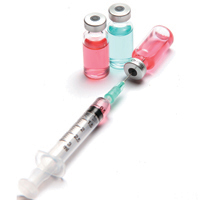Many adults get their annual flu shot, unaware that it’s not the only vaccine they need. Immunizations you got as a child may need a booster dose or an upgrade now that you’re an adult. If you travel abroad, there are several vaccines you may need. And women who plan to get pregnant or are carrying a child need protection throughout their pregnancy.
The US Centers for Disease Control and Prevention (CDC) has a list of recommended vaccinations all adults should consult and follow (See sidebar, “Common Vaccines for Adults.”) Having a bleeding disorder is not an excuse for opting out. Although many immunizations are given intramuscularly (in a muscle), some can be given subcutaneously, or under the skin. (See “Flu Facts,” HemAware, Winter 2013, page 8.) Further, your hemophilia treatment center (HTC) may recommend you treat with factor product before vaccinations are given. According to the National Hemophilia Foundation’s Nurses’ Guide to Bleeding Disorders, the risk of bleeding can be minimized by using a small-gauge needle and applying pressure on the injection site.
Although vaccinations for hepatitis A and B are part of the National Hemophilia Foundation’s (NHF’s) “Do the 5!” prevention tips and strongly urged by NHF’s Medical and Scientific Advisory Council (MASAC), there may be some people with hemophilia who still haven’t received the vaccines. Consult your HTC or primary care physician about getting vaccinated against hepatitis A and B, which are given in a series. (See “The Virtues of Vaccination,” HemAware, September/October 2009, page 34.)
The same virus that kept you out of school with chicken pox, varicella zoster, can lie dormant in nerve cells for years. A flare-up can then cause shingles, a severe rash with blisters and nerve pain. The CDC estimates that one-third of adults develop shingles during their lifetime. In 2006, the US Food and Drug Administration approved a vaccine to prevent shingles. It is recommended for adults 60 and older. However, it is not recommended for pregnant women, people with weakened immune systems, or those with HIV/AIDS, leukemia or lymphoma.

iStockphoto/Thinkstock
Pneumonia is a debilitating disease. In 2009 alone, the CDC estimates that more than 1 million Americans were hospitalized with complications from it. This lung infection, caused by bacteria or viruses, can start with a nagging cough and quickly progress to chills and fever, then fluid in the lungs. People at risk for contracting pneumonia include those with HIV/AIDS, liver or kidney disease, or diabetes, or who are 65 or older. In the bleeding disorders community, high-risk individuals include those with HIV or cirrhosis of the liver, or who have had an organ transplant. There are two types of pneumonia vaccines, so ask your physician which one is appropriate for you. Both protect you against pneumonia caused by bacteria.
In 2010, the CDC added new recommendations for the combined tetanus, diphtheria and pertussis vaccine after a spike in cases was reported. It now recommends that women be vaccinated during each pregnancy.
Staying current with vaccinations protects not only you from diseases and complications, but also your loved ones. So make an appointment with your primary care physician or staff at your HTC to find out which vaccines you need and then check them off your list.
Correction, October 23, 2013: The original version of this article stated that the risk of bleeding from vaccines can be minimized by using a smaller-gauge needle and applying pressure on the injection site. It should've said that a small-gauge needle would be best. This version has been updated.

